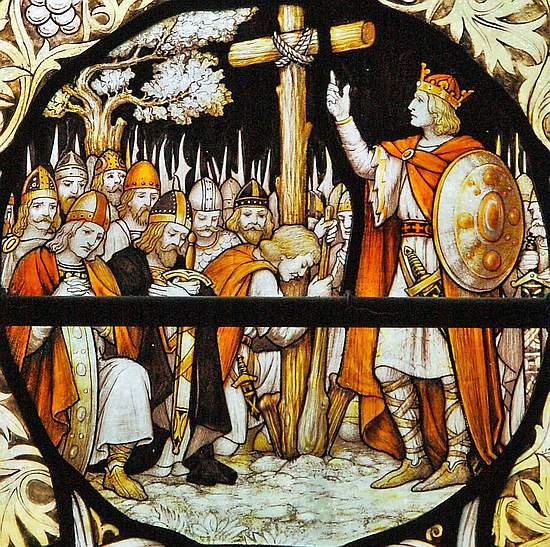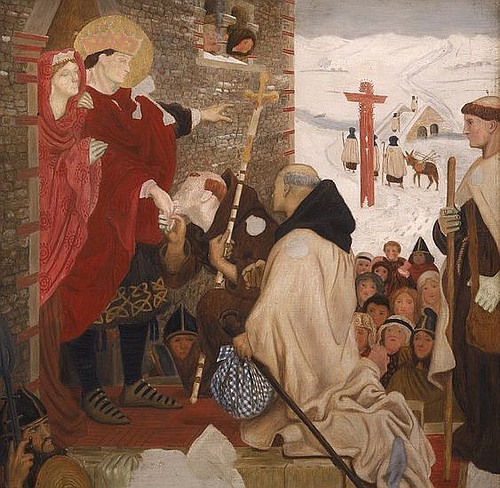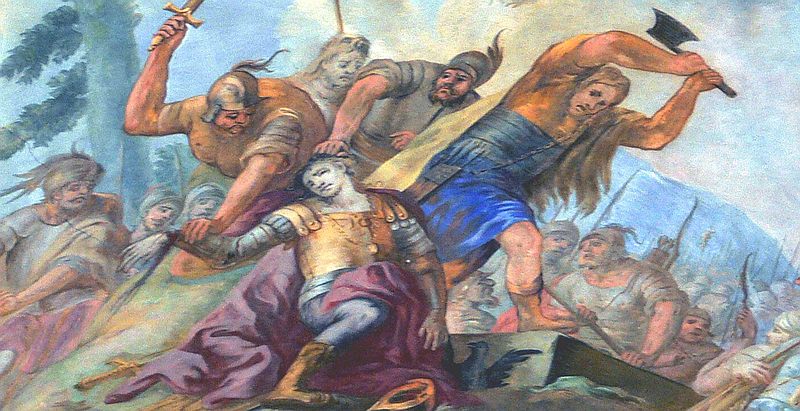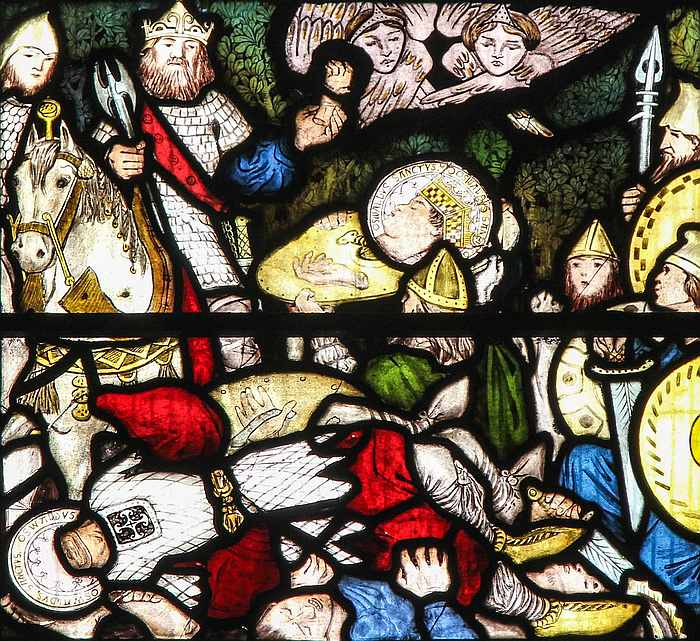Adapted from Various Sources.
St. Oswald, King of the Saxons and Martyr († 647; Feast – August 5)
The English Saxon Kingdom of the Northumbers was founded by King Ida in 547. After his death the northern
part called Bernicia was preserved by his children; but Deira, that is, the southern part, comprising Yorkshire and
Lancashire, was occupied by Alla, and after his death was recovered by Ethelfrid, grandson of Ida, who ruled the
whole Kingdom of the Northumbers for 24 years. He being slain in battle by Redwald, King of the East Angles, in 617,
his sons Eanfrid, Oswald, and Oswi took refuge among the Scots, where they were instructed in the Faith and baptized.
In the meantime Edwin, son of Alla, reigned 17 years over both kingdoms; but in 633 was killed fighting against the
united forces of Penda the Mercian and Cadwalla, King of the Britons – a Christian by profession, but a stranger to
the maxims of his religion – in his manners a barbarian, and an implacable enemy to the English Saxons. Upon this
revolution the three sons of Ethelfrid returned from Scotland; and Eanfrid, the eldest, obtained the Kingdom of Deira,
whilst Osric, the cousin of Edwin, was chosen King of Bernicia. Both these princes loved the glory of men more than God,
and apostatized from the Faith which they had embraced; but both were slain the same year by Cadwalla – Osric in battle,
and Eanfrid soon after by treachery.
Hereupon St. Oswald was called to the crown, both of Deira and Bernicia – he being both the son of
Ethelfrid and the nephew of Edwin. St. Oswald had embraced the Faith with his whole heart, and far from forsaking
Christ, as his unhappy brother had done, in order to court the favor of his subjects, he rather had no other end
in view than to bring them to the spiritual kingdom of Divine grace, and to labor with them to secure a crown of
eternal glory.
 At that time Cadwalla ravaged all the Northumbrian provinces, not as a conqueror, but as a cruel tyrant,
laying everything waste with fire and sword, at the head of a vast army, which he boasted nothing could resist.
St. Oswald assembled what troops he was able, and being fortified by faith in Christ, marched confidently,
though with a small force, against this mighty enemy, who had by that time proceeded as far as Picts' Wall
(also called Hadrian's Wall, built in 122 AD by the Roman forces as protection from raiding Picts).
St. Oswald gave him battle at a place called by St. Bede Denis-burn, that is, the brook Denis, adjoining to Picts' Wall
on the north side. Being come near the enemy camp, the evening before the engagement, the pious King caused a
great wooden cross to be made in haste, and he held it up himself with both hands whilst the hole dug in the earth
to plant it was filled up around the foot. When it was fixed, St. Oswald cried out to his army,
At that time Cadwalla ravaged all the Northumbrian provinces, not as a conqueror, but as a cruel tyrant,
laying everything waste with fire and sword, at the head of a vast army, which he boasted nothing could resist.
St. Oswald assembled what troops he was able, and being fortified by faith in Christ, marched confidently,
though with a small force, against this mighty enemy, who had by that time proceeded as far as Picts' Wall
(also called Hadrian's Wall, built in 122 AD by the Roman forces as protection from raiding Picts).
St. Oswald gave him battle at a place called by St. Bede Denis-burn, that is, the brook Denis, adjoining to Picts' Wall
on the north side. Being come near the enemy camp, the evening before the engagement, the pious King caused a
great wooden cross to be made in haste, and he held it up himself with both hands whilst the hole dug in the earth
to plant it was filled up around the foot. When it was fixed, St. Oswald cried out to his army, Let us now kneel down,
and together pray to the Omnipotent and only True God, that He would mercifully defend us from our proud enemy;
for He knows that we fight in a just war in defense of our lives and our country.
All the soldiers did as he
commanded them. The place where this cross was set up was called in the English tongue Hevenfelth – that is,
Heaven's Field – by a happy omen, says St. Bede; for before that time no church or altar was known to have been
raised in the whole kingdom of the Bernicians.
This cross of St. Oswald remained afterward very famous. St. Bede tells us that, up to his time, many cut little chips
from it, which they steeped in water; which being drank by sick persons, or sprinkled on them, many recovered their health.
He adds that after the death of St. Oswald, the monks of Hexham used to come to the place on the day before the anniversary
of his death, there to watch the night in prayer, reciting the office with many psalms for his soul (these prayers were
always changed into thanksgivings when the person was enrolled among the Martyrs), and the next morning to offer the
Holy Sacrifice of the Mass. A church was built on the spot sometime before St. Bede wrote – who mentions that one of
the monks of Hexham, named Bothelm, then living, having broken his arm by falling on the ice as he was walking in the
night, and having suffered a long time much anguish from the hurt, was perfectly cured one night by applying a little
of the moss, which was taken off from this cross and brought to him.
 The learned Alcuin, in his poem on the bishops and saints of York, relates how the pious King,
in no way daunted at the multitude and ferocity of his enemies, encouraged his soldiers to confidence in Christ,
and exhorted them to implore His protection prostrate with him on their faces before the cross which he had set up.
This author likewise adds an account of several miracles wrought down to his time in 780, at the relics of St. Oswald,
and at this cross; or, as St. Bede had written, by chips cut from it and steeped in water – by drinking which,
many were cured, even in Ireland and other distant countries. So great was the veneration of the people for this cross,
that the Abbey of Durham used for its seal, during several centuries, this cross on one side, and on the reverse the
figure of St. Oswald's head. Almighty God was pleased to bless the King's faith and devotion by granting him and his
small army a complete victory over Cadwalla, who was killed in the battle, and his forces – with those of his allies –
entirely routed.
The learned Alcuin, in his poem on the bishops and saints of York, relates how the pious King,
in no way daunted at the multitude and ferocity of his enemies, encouraged his soldiers to confidence in Christ,
and exhorted them to implore His protection prostrate with him on their faces before the cross which he had set up.
This author likewise adds an account of several miracles wrought down to his time in 780, at the relics of St. Oswald,
and at this cross; or, as St. Bede had written, by chips cut from it and steeped in water – by drinking which,
many were cured, even in Ireland and other distant countries. So great was the veneration of the people for this cross,
that the Abbey of Durham used for its seal, during several centuries, this cross on one side, and on the reverse the
figure of St. Oswald's head. Almighty God was pleased to bless the King's faith and devotion by granting him and his
small army a complete victory over Cadwalla, who was killed in the battle, and his forces – with those of his allies –
entirely routed.
St. Oswald, having given thanks to God, immediately set himself to restore good order throughout his dominions,
and to plant in them the Faith of Christ. By his ambassadors he entreated the king and bishops of Scotland to send him
a bishop and assistants, by whose preaching the people whom he governed might be grounded in the Christian religion,
and receive Baptism. St. Aidan (Feast – August 31), a native of Ireland, and a monk of the celebrated monastery
of Hij (Iona), was chosen for the great and arduous undertaking; and by his mildness soon repaired the mischief
done by another monk sent thither before him, whose harshness had alienated many from the sweet law of the Gospel.
The King bestowed on St. Aidan the isle of Lindisfarne for his episcopal seat; and was so edified by his learning and zeal,
that this great prince, before the Bishop could sufficiently speak the English language, would himself be his interpreter,
and explain his sermons and instructions to the people.
 St. Oswald filled his dominion with churches and monasteries, and whilst he was governing his temporal kingdom,
was intent only to labor and pray for an eternal crown. He very often continued in prayer from the time of Matins
(at midnight, when he rose with his monks) until dawn; and by reason of his frequent custom of praying or
giving thanks to Our Lord at all times, it is said that wherever he was sitting, he would have his hands on his knees
turned upward towards Heaven. St. Bede says that he reigned over Britons, Picts, Scots, and English. The Kingdom of
Northumberland was then extended as far as the Frith of Edinburgh; but by this expression of St. Bede, some other provinces
of the Picts and others in Wales must have paid homage to him. Penda the Mercian, being one of the allies of Cadwalla,
and probably present at his defeat, also paid him a kind of submission; and so great was his power, that all other kings
of the heptarchy acknowledged a certain dependence; whence Adamnan, Abbot of Hij, in the life of St. Columba, styles him
St. Oswald filled his dominion with churches and monasteries, and whilst he was governing his temporal kingdom,
was intent only to labor and pray for an eternal crown. He very often continued in prayer from the time of Matins
(at midnight, when he rose with his monks) until dawn; and by reason of his frequent custom of praying or
giving thanks to Our Lord at all times, it is said that wherever he was sitting, he would have his hands on his knees
turned upward towards Heaven. St. Bede says that he reigned over Britons, Picts, Scots, and English. The Kingdom of
Northumberland was then extended as far as the Frith of Edinburgh; but by this expression of St. Bede, some other provinces
of the Picts and others in Wales must have paid homage to him. Penda the Mercian, being one of the allies of Cadwalla,
and probably present at his defeat, also paid him a kind of submission; and so great was his power, that all other kings
of the heptarchy acknowledged a certain dependence; whence Adamnan, Abbot of Hij, in the life of St. Columba, styles him
Emperor of Britain.
Wonderful were the humility, affability, and charity of this great King amidst his prosperity;
of which St. Bede gives us the following instance. One Easter day as he was sitting down to dinner, an officer,
whose business it was to take care of the poor, came in and told him that there was a great multitude of poor people
at his gate desiring alms. Whereupon the King sent them a large silver dish full of meat from his own table,
and ordered the dish to be broken into small pieces and distributed among them. Upon this St. Aidan, who happened
to be at table, taking him by the right hand, said: Let his hand never corrupt.
St. Bede adds that this arm,
being cut off from his body after St. Oswald was slain, remained incorrupt till his time, and was then kept,
being honored by all with due veneration, in the church of St. Peter at the castle of Bebbaborough, (so called from Bebba,
a former queen), now Bamborough, in Northumberland. This arm was later kept at Peterborough.
When St. Oswald had reigned eight years in great prosperity, Penda, the barbarous pagan king of Mercia,
who nine years before had slain the pious King Edwin – uncle to St. Oswald on his mother's side – but had been vanquished
by our Saint in the beginning of his reign, found means again to raise a great army and invade the Christian dominions
of our holy King. St. Oswald met him with an inferior force and was killed in the battle that ensued. When he saw himself
surrounded with the arms of his enemies, he offered his prayer for the souls of his soldiers. Whence it became a proverb:
O God be merciful to their souls, said Oswald when he fell.”
He was slain at age 38, in the year of Our Lord 642,
on the 5th of August, in a place called Maserfield (probably near Winwick in Lancashire, where there is a well still called
St. Oswald's Well, which was formerly visited out of devotion.)

 The inhuman tyrant caused the Saint's head and arms to be cut off and fixed on poles; but St. Oswald's
brother and successor Oswi took them away the year following. He carried the arms to his own royal palace,
and sent the head to Lindisfarne. The head was afterwards put in the same shrine with the body of St. Cuthbert,
and with it translated to Durham. The rest of St. Oswald's body was translated by his niece Osfrida – wife of Etheldred,
King of Mercia – to the monastery of Bardney in Lincolnshire. During the Danish invasions these relics were removed to
Gloucester.
The inhuman tyrant caused the Saint's head and arms to be cut off and fixed on poles; but St. Oswald's
brother and successor Oswi took them away the year following. He carried the arms to his own royal palace,
and sent the head to Lindisfarne. The head was afterwards put in the same shrine with the body of St. Cuthbert,
and with it translated to Durham. The rest of St. Oswald's body was translated by his niece Osfrida – wife of Etheldred,
King of Mercia – to the monastery of Bardney in Lincolnshire. During the Danish invasions these relics were removed to
Gloucester.
The barbarous King Penda, after he had slain five pious kings, turned his arms against Oswi, who tried in
vain to soften him by presents and the most favorable proposals. Seeing himself rejected by man, Oswi turned to prayer,
and bound himself by vow, should he be victorious, to consecrate to God his daughter Enfleda, who was then only one year old,
and to give with her twelve portions of land to build and endow monasteries. God heard his prayer, and Oswi,
with an inferior army, defeated and slew the tyrant near Loyden, now Leeds in Yorkshire, in 655. The place of this
victory was called Winwaed or Field of Victory.
Back to "In this Issue"
Back to Top
Back to Saints
NEW: Alphabetical Index
Contact us: smr@salvemariaregina.info
Visit also: www.marienfried.com


 At that time Cadwalla ravaged all the Northumbrian provinces, not as a conqueror, but as a cruel tyrant,
laying everything waste with fire and sword, at the head of a vast army, which he boasted nothing could resist.
St. Oswald assembled what troops he was able, and being fortified by faith in Christ, marched confidently,
though with a small force, against this mighty enemy, who had by that time proceeded as far as Picts' Wall
(also called Hadrian's Wall, built in 122 AD by the Roman forces as protection from raiding Picts).
St. Oswald gave him battle at a place called by St. Bede Denis-burn, that is, the brook Denis, adjoining to Picts' Wall
on the north side. Being come near the enemy camp, the evening before the engagement, the pious King caused a
great wooden cross to be made in haste, and he held it up himself with both hands whilst the hole dug in the earth
to plant it was filled up around the foot. When it was fixed, St. Oswald cried out to his army,
At that time Cadwalla ravaged all the Northumbrian provinces, not as a conqueror, but as a cruel tyrant,
laying everything waste with fire and sword, at the head of a vast army, which he boasted nothing could resist.
St. Oswald assembled what troops he was able, and being fortified by faith in Christ, marched confidently,
though with a small force, against this mighty enemy, who had by that time proceeded as far as Picts' Wall
(also called Hadrian's Wall, built in 122 AD by the Roman forces as protection from raiding Picts).
St. Oswald gave him battle at a place called by St. Bede Denis-burn, that is, the brook Denis, adjoining to Picts' Wall
on the north side. Being come near the enemy camp, the evening before the engagement, the pious King caused a
great wooden cross to be made in haste, and he held it up himself with both hands whilst the hole dug in the earth
to plant it was filled up around the foot. When it was fixed, St. Oswald cried out to his army,  The learned Alcuin, in his poem on the bishops and saints of York, relates how the pious King,
in no way daunted at the multitude and ferocity of his enemies, encouraged his soldiers to confidence in Christ,
and exhorted them to implore His protection prostrate with him on their faces before the cross which he had set up.
This author likewise adds an account of several miracles wrought down to his time in 780, at the relics of St. Oswald,
and at this cross; or, as St. Bede had written, by chips cut from it and steeped in water – by drinking which,
many were cured, even in Ireland and other distant countries. So great was the veneration of the people for this cross,
that the Abbey of Durham used for its seal, during several centuries, this cross on one side, and on the reverse the
figure of St. Oswald's head. Almighty God was pleased to bless the King's faith and devotion by granting him and his
small army a complete victory over Cadwalla, who was killed in the battle, and his forces – with those of his allies –
entirely routed.
The learned Alcuin, in his poem on the bishops and saints of York, relates how the pious King,
in no way daunted at the multitude and ferocity of his enemies, encouraged his soldiers to confidence in Christ,
and exhorted them to implore His protection prostrate with him on their faces before the cross which he had set up.
This author likewise adds an account of several miracles wrought down to his time in 780, at the relics of St. Oswald,
and at this cross; or, as St. Bede had written, by chips cut from it and steeped in water – by drinking which,
many were cured, even in Ireland and other distant countries. So great was the veneration of the people for this cross,
that the Abbey of Durham used for its seal, during several centuries, this cross on one side, and on the reverse the
figure of St. Oswald's head. Almighty God was pleased to bless the King's faith and devotion by granting him and his
small army a complete victory over Cadwalla, who was killed in the battle, and his forces – with those of his allies –
entirely routed. St. Oswald filled his dominion with churches and monasteries, and whilst he was governing his temporal kingdom,
was intent only to labor and pray for an eternal crown. He very often continued in prayer from the time of Matins
(at midnight, when he rose with his monks) until dawn; and by reason of his frequent custom of praying or
giving thanks to Our Lord at all times, it is said that wherever he was sitting, he would have his hands on his knees
turned upward towards Heaven. St. Bede says that he reigned over Britons, Picts, Scots, and English. The Kingdom of
Northumberland was then extended as far as the Frith of Edinburgh; but by this expression of St. Bede, some other provinces
of the Picts and others in Wales must have paid homage to him. Penda the Mercian, being one of the allies of Cadwalla,
and probably present at his defeat, also paid him a kind of submission; and so great was his power, that all other kings
of the heptarchy acknowledged a certain dependence; whence Adamnan, Abbot of Hij, in the life of St. Columba, styles him
St. Oswald filled his dominion with churches and monasteries, and whilst he was governing his temporal kingdom,
was intent only to labor and pray for an eternal crown. He very often continued in prayer from the time of Matins
(at midnight, when he rose with his monks) until dawn; and by reason of his frequent custom of praying or
giving thanks to Our Lord at all times, it is said that wherever he was sitting, he would have his hands on his knees
turned upward towards Heaven. St. Bede says that he reigned over Britons, Picts, Scots, and English. The Kingdom of
Northumberland was then extended as far as the Frith of Edinburgh; but by this expression of St. Bede, some other provinces
of the Picts and others in Wales must have paid homage to him. Penda the Mercian, being one of the allies of Cadwalla,
and probably present at his defeat, also paid him a kind of submission; and so great was his power, that all other kings
of the heptarchy acknowledged a certain dependence; whence Adamnan, Abbot of Hij, in the life of St. Columba, styles him

 The inhuman tyrant caused the Saint's head and arms to be cut off and fixed on poles; but St. Oswald's
brother and successor Oswi took them away the year following. He carried the arms to his own royal palace,
and sent the head to Lindisfarne. The head was afterwards put in the same shrine with the body of St. Cuthbert,
and with it translated to Durham. The rest of St. Oswald's body was translated by his niece Osfrida – wife of Etheldred,
King of Mercia – to the monastery of Bardney in Lincolnshire. During the Danish invasions these relics were removed to
Gloucester.
The inhuman tyrant caused the Saint's head and arms to be cut off and fixed on poles; but St. Oswald's
brother and successor Oswi took them away the year following. He carried the arms to his own royal palace,
and sent the head to Lindisfarne. The head was afterwards put in the same shrine with the body of St. Cuthbert,
and with it translated to Durham. The rest of St. Oswald's body was translated by his niece Osfrida – wife of Etheldred,
King of Mercia – to the monastery of Bardney in Lincolnshire. During the Danish invasions these relics were removed to
Gloucester.